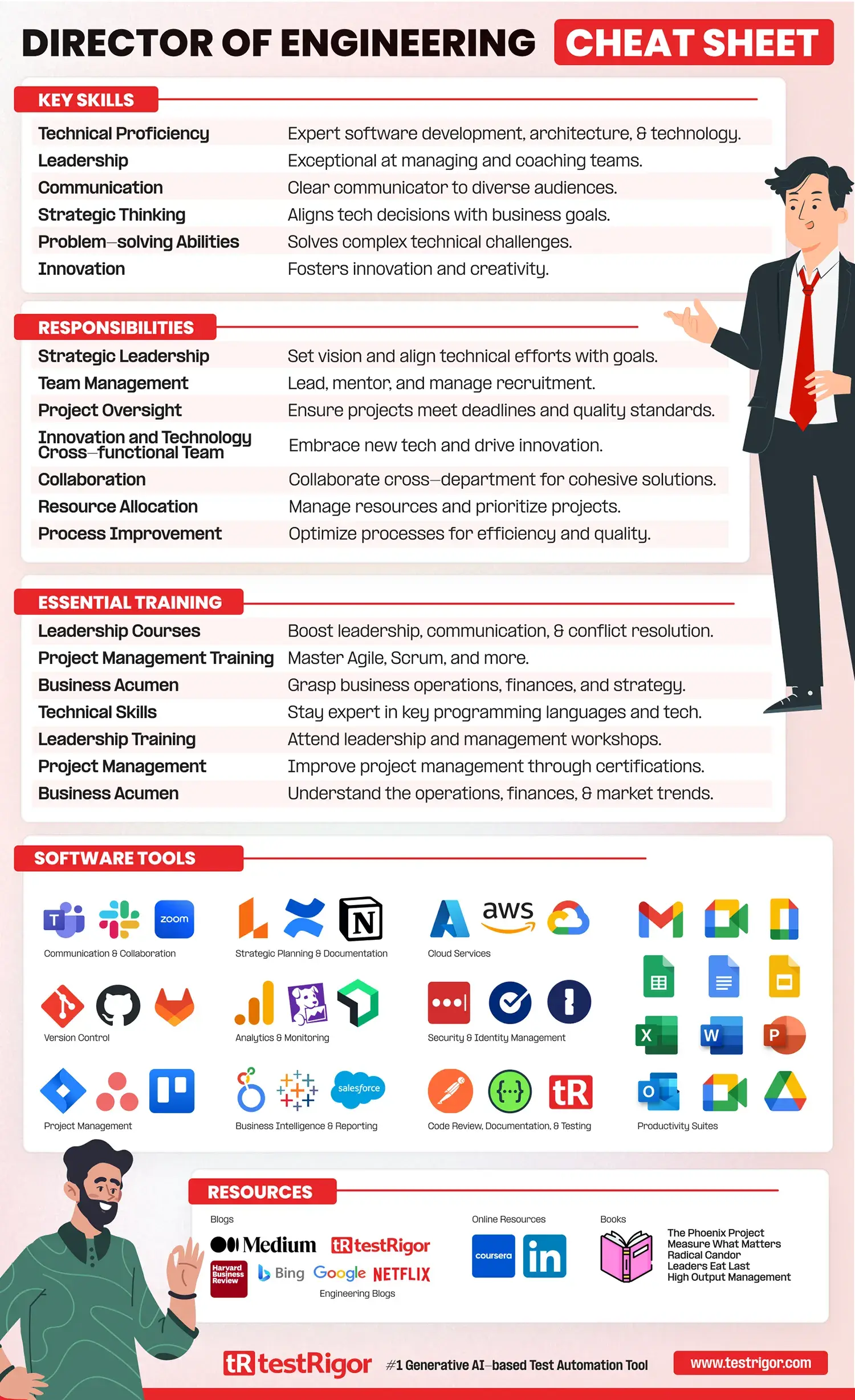 |
Pragya Yadav
|
Copy the code below to embed the above infographic on your website:
The Director of Engineering is a responsible and huge role requiring a rich skill set, including – technical expertise, people management skills, leadership, communication, and many more.
This concise cheat sheet provides an overview of the required capabilities, responsibilities, skills, training, resources, and software tools to help you excel.
Key Skills
| Skills |
Description |
| Technical Proficiency |
Strong understanding of software development, architecture, and relevant technologies. |
| Leadership |
Exceptional people management, coaching, and team-building skills. |
| Communication |
Clear and effective communication across technical and non-technical audiences is required. |
| Strategic Thinking |
Ability to align technical decisions with business goals. |
| Problem-solving Abilities |
Skillful at addressing complex technical challenges and making informed decisions. |
| Innovation |
Promotes a culture of creativity and exploration within the engineering teams. |
Responsibilities
| Responsibility |
Description |
| Strategic Leadership |
- Develop and communicate a clear engineering vision and strategy.
- Collaborate with other departments to align technical efforts with company goals.
|
| Team Management |
- Lead, mentor, and motivate engineering teams.
- Manage team structure, recruitment, and performance evaluations.
|
| Project Oversight |
- Ensure projects are executed efficiently, meeting deadlines and quality standards.
- Provide guidance to resolve technical challenges and bottlenecks.
|
| Innovation and Technology |
- Stay up-to-date with emerging technologies and industry trends.
- Foster an environment of innovation and continuous improvement.
|
| Cross-functional Team Collaboration |
- Work closely with Product, Design, and other departments to deliver cohesive solutions.
- Facilitate communication between technical and non-technical stakeholders.
|
| Resource Allocation |
- Manage engineering resources, including budget, tools, and infrastructure.
- Prioritize projects and allocate resources effectively.
|
| Process Improvement |
- Optimize engineering processes, workflows, and methodologies to enhance efficiency and quality.
|
Resources
| Resource Type |
Description |
| Online Resources |
- Coursera, Udemy: Learn various leadership, project management, and technical skills courses here.
- LinkedIn Learning: Offers a variety of courses on leadership development and technical subjects.
|
| Blogs |
- Harvard Business Review: Offers many articles on leadership, management, and business strategies.
- Medium: Many tech professionals share insights on engineering leadership and best practices.
- Engineering Blogs: Follow engineering blogs of companies like Google, Microsoft, and Netflix for insights into their engineering culture.
- testRigor Blog: Talks about AI, automation, software engineering, and testing insights.
|
| Books |
- The Phoenix Project by Gene Kim, Kevin Behr, and George Spafford
- Measure What Matters by John Doerr
- Radical Candor by Kim Scott
- Leaders Eat Last by Simon Sinek
- High Output Management by Andrew S. Grove
|
| Related Articles |
|
Essential Training
| Training |
Description |
| Leadership Courses |
Enhance leadership, communication, and conflict-resolution skills. |
| Project Management Training |
Agile, Scrum, and other methodologies. |
| Business Acumen |
Understanding business operations, financials, and strategy. |
| Technical Skills |
Maintain expertise in relevant programming languages, technologies, and engineering practices. |
| Leadership Training |
Attend workshops, seminars, and leadership, communication, and management courses. |
| Project Management |
Enhance project management skills through certifications like PMP or Agile methodologies. |
| Business Acumen |
Develop an understanding of business operations, financial management, and market trends. |
Software Tools
| Tool Type |
Description |
| Project Management |
- Jira: Advanced project tracking and management tool.
- Asana: Task and project management software with a focus on collaboration.
- Trello: Visual task management for teams and projects.
|
| Version Control |
- Git: Distributed version control system for managing source code.
- GitHub or Bitbucket: Platforms for hosting and collaborating on code repositories.
- GitLab: Integrated platform for DevOps, source code management, and CI/CD.
|
| Communication and Collaboration |
- Slack: Real-time communication and collaboration platform for teams.
- Microsoft Teams: Collaboration hub for chat, meetings, file sharing, and integrations.
- Zoom or Microsoft Teams Meetings: Video conferencing for team meetings and communication.
|
| Analytics and Monitoring |
- Google Analytics: Web analytics service for tracking website usage.
- New Relic: Application performance monitoring and management.
- Datadog: Monitoring and analytics platform for cloud-scale applications.
|
| Business Intelligence and Reporting |
- Tableau or Power BI: Data visualization tools for creating insightful reports and dashboards.
- Looker: Business intelligence and data visualization platform.
|
| Strategic Planning and Documentation |
- Confluence: Collaboration tool for creating, sharing, and collaborating on documents.
- Lucidchart: Online diagramming and visual communication tool.
|
| Security and Identity Management |
- Okta: Identity and access management for securing applications and data.
- LastPass or 1Password: Password managers for secure access to accounts.
|
| Cloud Services |
- AWS Management Console or Azure Portal: Cloud service management interfaces for AWS or Azure.
|
| Productivity and Collaboration Suites |
- Microsoft 365: Suite of productivity and collaboration tools.
- Google Workspace: Cloud-based productivity and collaboration tools.
|
| Code Review, Documentation, and Testing |
- Code Review Platforms: Pull request tools integrated with version control (e.g., GitHub Pull Requests, Bitbucket).
- Swagger or Postman: Tools for API documentation and testing.
- testRigor: A modern no-code AI-powered test automation tool for mobile, web, and desktop applications.
|
Designations
- Director of Engineering
- Head of Engineering
- VP of Engineering
Conclusion
This cheat sheet provides a snapshot of the Director of Engineering role to advance in the career graph smoothly. However, it is worth noting that this role is multifaceted, requiring a balance of technical expertise, leadership skills, and business acumen.
Hence, it is required to regularly adapt and learn to lead your engineering teams towards innovation and success.













